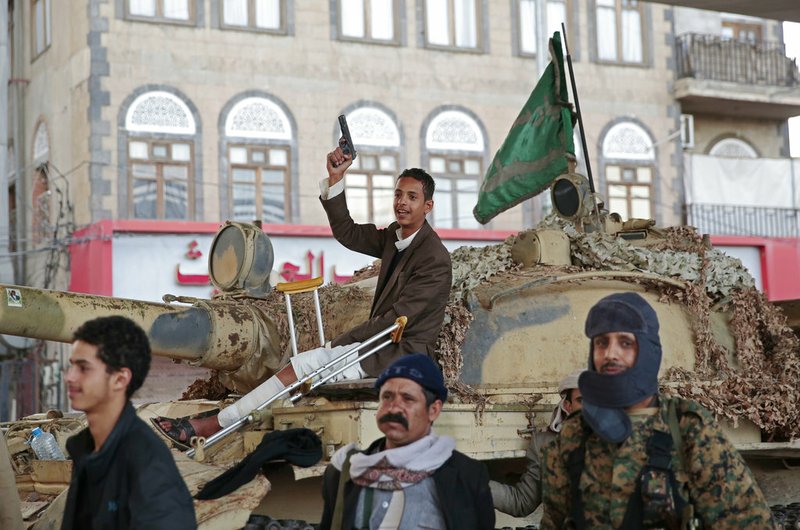SANAA, Yemen -- A senior leader of Yemen's Shiite rebels said Monday that the group will halt rocket fire into Saudi Arabia for the sake of peace efforts, answering a key Saudi demand in the first public sign of hope for the latest push to stop the bloodshed and civilian suffering in the Arab world's poorest country.
The announcement, however, looked less than airtight, as the rebel defense ministry also said it had fired a ballistic missile into Saudi Arabia overnight in response to an attempted border incursion in Hajjah province, adding in its statement that while it supported halting missile launches it also reserved the right to respond to attacks.
For the past three years, a U.S.-backed, Saudi-led coalition has been waging war against the rebels, known as Houthis, to restore Yemen's internationally recognized government to power. The rebels say they had been excluded from that government and took power to rectify historic grievances against central authority.
The rebel leader, Mohammed Ali al-Houthi, said in a statement to journalists that the Iran-backed rebels ordered the cessation of rocket and drone attacks on the Saudis and forces loyal to coalition member the United Arab Emirates at the request of U.N. special envoy Martin Griffiths.
"We are ready to freeze and stop military operations on all fronts in order to achieve peace," al-Houthi said, mentioning the rockets specifically as part of a longer statement in which he blamed the United States for being the main driver for what he called "the aggression" against Yemen. The overnight missile strike, according to Houthi media channel al-Masirah, was also in response to a Saudi airstrike in the area.
Yemen's civil war began in the wake of its Arab Spring uprising, when the Houthis swept down from their northern stronghold and took the capital, Sanaa, in 2014, with the help of troops loyal to Yemen's former strongman, Ali Abdullah Saleh. The government fled the following year, and Saudi Arabia, citing fears that its nemesis Iran was using the Shiite leanings of the revolt to make inroads on the Arabian Peninsula, began launching airstrikes against the rebels.
Riyadh formed a coalition of Sunni Arab states, including the UAE, Kuwait, Egypt and Sudan, and launched ground assaults on several fronts but failed to take the capital. After some major setbacks, it began outsourcing the ground fighting to local troops, including a group trained by the UAE in the south.
The latest Saudi-led offensive, which began in the summer, has been focused on capturing the key rebel-held port city of Hodeida, through which almost all of Yemen's food and desperately needed humanitarian aid flows.
Griffiths, the U.N. envoy, announced on Friday that both sides had agreed to attend talks in Sweden "soon" aimed at ending the conflict. His announcement followed an informal de-escalation last week around Hodeida, although fighting has continued on the ground in other areas. The internationally backed government led by President Abed Rabbo Mansour Hadi said in a separate statement Monday that it would attend, but also insisted the Houthis do so as well "unconditionally."
Saudi Arabia's King Salman, in his annual policy speech, said his country supports a political solution to end the war. But he envisions something in line with a U.N. resolution that calls on the rebels to withdraw from all major cities they have taken, a demand they have yet to cede and have so far been able to resist militarily on the ground.
It was not immediately to what extent the Houthi move on stopping missile fire into the kingdom would halt the overall violence. While the guns have gone silent inside central Hodeida, fighting continues in its outskirts and elsewhere, including the provinces of Marib, Dhale, Bayda, and the Houthis' northern strongholds of Hajjah and Saada.
Truces rarely hold entirely in Yemen's disorderly civil war, where fighting is on several fronts, and peace talks attempts abroad have repeatedly broken down.
An estimated 10,000 people have been killed in the war so far, and two-thirds of Yemen's 27 million-strong population relies on aid. More than 8 million are at risk of starvation in what has become the world's worst humanitarian disaster.
The renewal of the coalition's push on Hodeida began almost immediately after the United States called for a cease-fire within a 30-day period terminating at the end of the month. In an apparent rush to try to seize the city before then, coalition artillery, helicopter gunships and airstrikes pounded the rebels, killing dozens of fighters and civilians on both sides.
The coalition troops, backed by the airstrikes, advanced into the city's outskirts but the offensive stalled under fierce, dug-in Houthi resistance some 5 kilometers short of the vital port facilities, the city's main prize.
International outcry over the murder of Saudi journalist Jamal Khashoggi at Saudi Arabia's consulate in Istanbul on Oct. 2 has also upped international political pressure on Riyadh and cast more attention on a war in Yemen often overlooked in the West. That, combined with the U.S.'s withdrawal of refueling support for Saudi-led airstrikes and calls for cease-fire could be a main driver for sudden Saudi and UAE peace efforts.
Rohan reported from Cairo.
NW News on 11/20/2018

